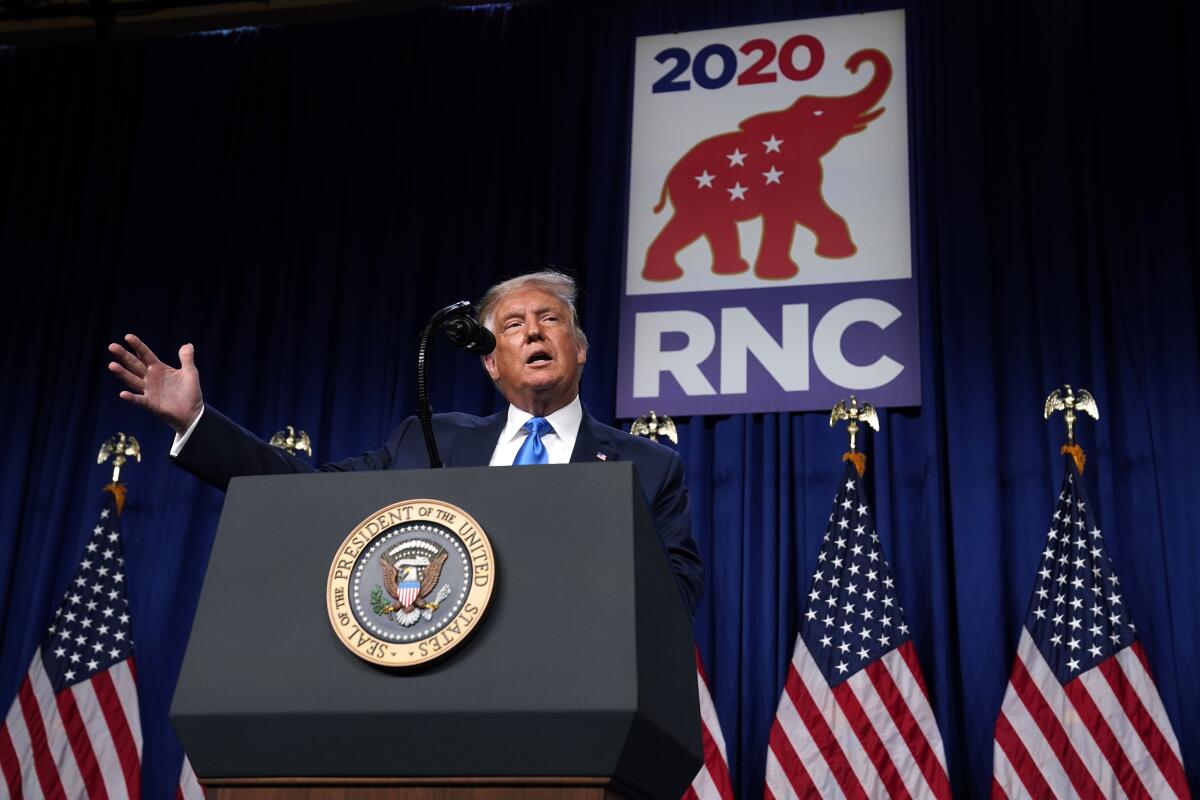Editorial: Sorry, Mr. President. There’s no miracle cure for COVID-19

Like the scientists working to develop COVID-19 treatments and vaccines, President Trump desperately wants to announce a cure that will signal the beginning of the end of the pandemic that has killed more than 177,000 Americans.
Unlike the scientists, however, the president isn’t content to wait until there is actual proof of a cure to make that announcement.
On Sunday, Trump held a televised press conference to personally give Americans the good news about a “historic breakthrough” for treating COVID-19 infections that is “safe” and “will save countless lives.” The breakthrough in question? An experimental treatment in which blood plasma from people who have recovered from the coronavirus is injected into those who are sick, thus transferring protective antibodies.
The treatment does hold some promise, but scientists are skeptical that it is truly a breakthrough. One study by the Mayo Clinic sponsored by the National Institutes of Health found that COVID-19 patients who received plasma therapy within three days of diagnosis showed a statistically significant, if still small, improvement of mortality over patients who received it later in the infection.
But the study did not have a control group of patients who received a placebo, and it has not been peer-reviewed. For those reasons, top health officials, including Dr. Anthony Fauci, head of the National Institute of Allergy and Infectious Diseases, urged the Food and Drug Administration not to give it emergency approval. Nevertheless, the FDA did exactly that a day after Trump complained the “deep state” at the FDA was obstructing COVID-19 medicines to make him look bad, giving him something to crow about on the eve of the Republican National Convention.
Indeed it seems that even if the plasma therapy is as effective as the president says it will be, it may not be enough to stop the pandemic. On Monday, Hong Kong researchers reported the first documented case of someone who’d recovered from COVID-19 becoming infected again. That’s dispiriting because it means that antibody treatments and vaccines may not provide lasting protection against infection.
Trump’s zeal for a COVID-19 cure would be laudable if his motives weren’t so nakedly self-serving and the results so problematic. When Trump decided that hydroxychloroquine, an anti-malarial drug, was a magic cure when paired with a powerful antibiotic, he would not stop talking about its promise, leading one hapless man to die after self medicating with chloroquine phosphate. The FDA gave hydroxychloroquine emergency approval as well, but pulled it later after risks of the drug began outweighing the potential benefits.
Thank goodness the FDA wasn’t so reckless to humor the president when he mused that it might be useful to test bleach injections or internal ultraviolet light as COVID-19 treatments. We shudder to think what Trump might cook up for an October surprise, such as a rushed vaccine that hasn’t completed its third and most extensive phase of clinical trials.
We all want to find a cure for COVID-19 so life can return to something like normal. But if the credibility of the agency tasked with ensuring treatments are safe and effective continues to be eroded by Trump’s manipulations, will Americans trust one if and when one comes along?
More to Read
A cure for the common opinion
Get thought-provoking perspectives with our weekly newsletter.
You may occasionally receive promotional content from the Los Angeles Times.










